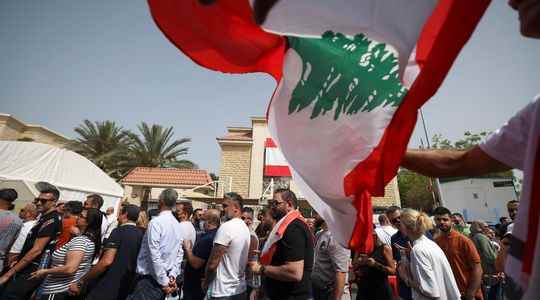The cell phone of Mona, a 34-year-old architect from Beirut, keeps ringing. “Hello, I’m calling you from party X, I offer to pay for transport and offer you lunch on election day. Does that suit you like a deal?” Said a lady to the device. “A guy who works for a competing party offered me money directly. I yelled at him! I’m not in need and don’t vote for traditional parties, but imagine all those Lebanese in barking right now…” berates Mona. A few days before the legislative elections of May 15, the patronage machine, most often of a denominational nature, is running at full speed.
“In the absence of the state, practices such as granting building permits, gas bonuses, jobs, school grants and the like have become part of the system,” laments Cendrella Azar, of the Lebanese Association for Democratic Elections (Lade). In a context of unprecedented economic crisis – more than three quarters of the population now live below the poverty line – some candidates are shamelessly exploiting the growing needs of the population. “Voters are much more vulnerable, since they lack everything, food, electricity, water or fuel oil. Many agree to sell their vote, an act perceived as simple assistance”, continues the member of the The. The sums offered vary between 100 and 1,000 dollars. Considerable amounts while the average monthly salary is now equivalent to 72 dollars, due to the depreciation of the national currency.
In this game of one-upmanship, the parties do not even hide. The Murr family, which has provided services to its “customers” for decades, is the epitome of this model. The grandson and namesake of former minister Michel Murr is a candidate for one of the two Greek-Orthodox seats in the constituency of Metn (Mount Lebanon region). He can rely on the influence built up over decades by his father – also a former minister – and his grandfather. Last month, he almost congratulated himself on maintaining this clientelist system: “The state being absent, it is our duty as Lebanese to stand alongside the people.” “The election period is the time when people mark their allegiance by thanking their political leader for having hired a nephew, or for having paid the hospitalization costs of an aunt”, explains Nadim Houry, director of the Arab Reform Initiative, a think tank.
Egg packs or bread bags
These elections are the first since the uprising of October 17, 2019, where part of the Lebanese population demanded fundamental reforms of the political system. This wind of change has resulted in the formation of civil society groups, which today come up against the well-established practices of traditional parties. Electoral corruption that threatens equal opportunities between candidates. “Many people around me advise me to do ‘good clientelism’ by helping on the right and left, because ‘that’s Lebanon’, but I firmly refuse to do so”, confides an independent candidate, who has has made the fight against corruption one of its priorities.
In this game of one-upmanship, certain figures compete in ingenuity. Packs of eggs or bags of bread bearing party logos have, for example, been distributed in certain regions. The wealthy businessman and Sunni deputy Fouad Makhzoumi, close to the former French Prime Minister François Fillon and accused of influence peddling, did not hesitate to distribute food stamps, in the Beirut II constituency, to an amount of 750,000 Lebanese pounds ($28). The Makhzoumi foundation even organized a “beauty day” on April 22, offering haircuts and coloring at a symbolic price.
Another candidate, a Christian, owner of a hospital and a care center in the suburbs of Beirut, offered a day of free medical services. Behaviors that no longer shock the Lebanese. In Hrajel, a village of 3,000 inhabitants in the Kesrouan mountains, some voters will roll for the zaïm (leader) who will be the most generous. “They do good, that’s how I see it. The system is not about to change, so I might as well take advantage of it,” says Elie, a trader struggling to make ends meet. Walid, a bookseller from the same village, will vote for one of the local leaders, and his wife for the other. “They help us from time to time”, he justifies. But he set himself a red line: “On D-Day, you will see people queuing after dropping off their ballot to collect an envelope of money. I’d rather die than stoop to that.”
